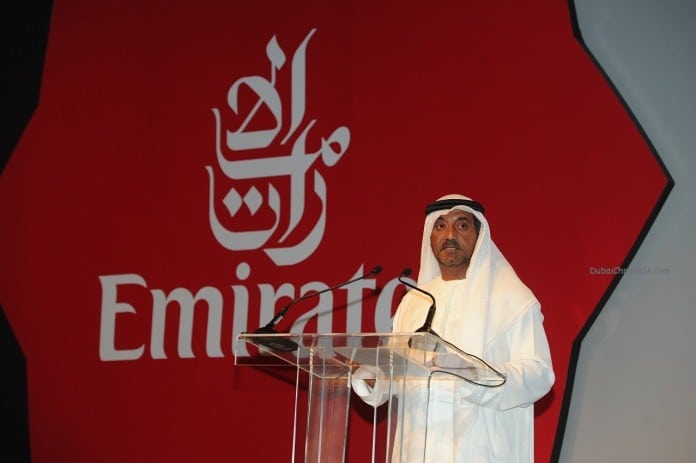
Arab airlines have increasing impact and visibility on the global stage, with many countries in the Arab world recognizing the economic importance of aviation and investing in infrastructure, said His Highness (HH) Sheikh Ahmed bin Saeed Al-Maktoum, Chairman and Chief Executive of Emirates Airline & Group, President of Dubai Civil Aviation Authority, and Chairman Dubai Airports.
Sheikh Ahmed made his remarks as Patron of the 47th Arab Air Carriers Organization Annual General Meeting (AACO AGM), at the event’s official opening dinner held last night in Dubai.
Sheikh Ahmed said: “47 years ago, in 1967, the world’s airlines transported less than 300 million passengers annually. Today, airlines serve an estimated 3.3 billion passengers. What’s more, the 31 airline members of AACO are playing a bigger role in world air traffic than ever before. According to figures from Airbus, in less than 10 years between 2003 and 2013, the number of passengers carried by airlines in Middle East and North Africa has increased by more than 300%.
“In the past, European airports were the default hubs for travellers flying East to West, or North to South. Today, more and more travellers are choosing to fly via hubs in our region. Because we can offer better connection times, and a better travel experience. This huge shift in global aviation is a success story for all of us. As individual airlines, and together with our home countries, we have made the world sit up and take notice.”
Aviation as an economic driver
He also remarked that aviation is recognised as a key economic driver in many Middle East and North African countries, citing the UAE and Dubai as an example.
“The latest study from Oxford Economics show that the aviation sector contributed 26.7% to Dubai’s GDP in 2013, and supported over 400,000 jobs. In 2020, aviation’s contribution to Dubai’s GDP is expected be US$53 billion. And by 2030, this will rise to US$88.1 billion. This is a powerful story. It proves that aviation can have a huge positive impact on economies if there is a clear strategy, and collaboration.
“Dubai has its own model. But we are certainly not the only ones in the Arab world who see aviation as a key economic driver. Many Arab airlines are investing in new efficient aircraft, new technologies, better onboard products, and better service. Many of the world’s latest – and biggest – infrastructure projects in aviation, are happening right here in the Arab world.”
Bright prospects for Arab aviation
Citing IATA forecasts, Sheikh Ahmed noted that the aviation industry expects to see massive growth over the next 20 years with 7 billion passengers expected to take to the skies by 2034. The Middle East region is also expected to have the highest growth rate at 4.9% per annum, the same rate as Asia Pacific, while Africa will see a growth rate of 4.7% per annum.
“Both Airbus and Boeing forecast that airlines in our region will need more than 2,000 new aircraft over the next 20 years. That’s worth hundreds of billions of dollars. Think about what this might mean for the global aviation supply chain in terms of jobs and more. There is no doubt that our impact on the global aviation industry is increasing,” he said.
Sheikh Ahmed noted that airlines will continue to face external challenges such as aeropolitics, global economics, health pandemics, armed conflict, amongst others. However, prospects for Arab carriers remain bright as the airlines continue to compete commercially, while working together through platforms such as the AACO to tackle issues of common interest collectively.






















![The Square at Nad Al Sheba Gardens Now Open hope tax season treated you well! Just checking in—ready to refocus on growing your business? I remember how we discussed scaling your [specific aspect of their business, e.g., online presence] but paused due to time constraints. We now offer a streamlined 6-month plan that delivers real results without adding to your workload. Let me know if you'd like to chat—I’d love to help you pick up where we left off!](https://www.dubaichronicle.com/wp-content/uploads/2024/11/The-Square-5-218x150.jpg)









